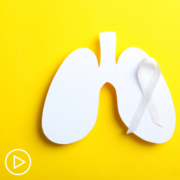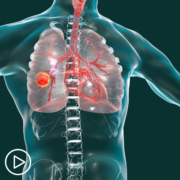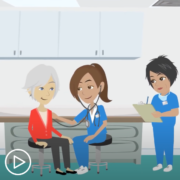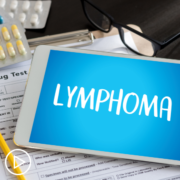Insist on Better Lung Cancer Care | Tips for Essential Communication
Insist on Better Lung Cancer Care | Tips for Essential Communication from Patient Empowerment Network on Vimeo.
How can you advocate for the best lung cancer care? Lung cancer specialist Dr. Isabel Preeshagul provides an overview of lung cancer healthcare team members, reviews how treatment goals are determined, and shares advice for communication with your care team.
Dr. Isabel Preeshagul is a thoracic medical oncologist at Memorial Sloan Kettering Cancer Center. Learn more about Dr. Preeshagul.
See More From INSIST! Lung Cancer
Related Resources:
Transcript:
Katherine Banwell:
I’d like to start with a question pertaining to our series title, Insist. Why is it essential for patients to collaborate with their providers on care treatment decisions?
Dr. Isabel Preeshagul:
So, collaborating is so important, right? I always tell my patients this is not a dictatorship, right? This is a collaborative effort where I’m here to guide you, but you are the captain of the ship.
You are the one that needs to make all of the decisions, and I’m here to make sure that the ship goes in a smooth direction, so making sure we have open lines of communication that the patients and their caregivers feel comfortable talking to me and my team and also vice versa and that we trust each other. It’s so important because we are going for a marathon, right? We’re not going for a sprint. This is a long-term relationship, whether we’re treating for cure or we’re treating you with palliative intent and it’s treatable but not curable. We’re going to be following with each other for a long time.
Katherine Banwell:
A lung cancer healthcare team, of course, consists of a number of different providers. Would you tell us about the various members on a team?
Dr. Isabel Preeshagul:
Sure. So, there is – there are the people that do the scheduling, that make sure that the CAT scan is scheduled, that the MRI is done, your chemo gets scheduled, all of that. The schedulers are super important and an integral part of our team.
And then we also have our office coordinators that answers the phone calls and passes along the messages and assists with scheduling and sort of sets expectations and is the face of the practice. Then you have an office practice nurse or an oncology practice nurse who is the doctor’s right hand, making sure that the patients get proper chemotherapy teaches, making sure that they understand about possible side effects, risks versus benefits, making sure medications are up to date, assessing symptoms.
They are sort of the front line when it comes to any patient call they’re triaging, and they’re escalating or deescalating. That would be the office practice nurse. And then you have an advanced care practitioner, an APP. You either have a nurse practitioner or a PA that’s working with you that’s sometimes seeing patients independently, sometimes putting chemotherapy orders, you know, really serving as almost as another doctor.
If for some reason there is something that the doctor’s not available to do, the doctor needs in a pinch, or my patients that are almost at long-term follow-up that are doing great that are just kind of coasting, I will share with my NP and make sure that they know her just as well as they know me. And sometimes there’s a fellow, or there’s a resident or there’s a med student that’s part of the team as well because see one, do one, teach one. It’s really important to teach those that are coming after you and serve as mentors and really include them in part of the team and part of the decision-making. And then you have the doctor that just kind of oversees everything.
Katherine Banwell:
Of course. How would you define treatment goals for people with lung cancer?
Dr. Isabel Preeshagul:
So, the goal of treatment, I think, is really contingent upon someone’s stage, but it’s also contingent upon what’s important to the patient, right? So, we have patients that are stage I all the way to stage IIIC that we treat with intention to cure.
And patients that have stage IV disease, it’s treatable but not curable. So, I am very transparent with that as long as I have the information to have that discussion. With that being said, there are some patients with stage III disease or stage I disease that don’t really want treatment and want to focus on quality of life. And that’s okay too. And in which case, you know, at some point, their cancer will likely progress. How quickly or when that will happen, we don’t know. Could they pass from something else? It’s possible. But you really need to talk about what’s important to the patient, because it’s not always cut and dry.
Katherine Banwell:
As you mentioned, Dr. Preeshagul, there are several different support members on a team. What would you say to patients or even care partners who can sometimes feel like they’re bothering their healthcare team with their questions and comments?
Dr. Isabel Preeshagul:
So, we do get that concern a lot. And I always say, “I’m here for you 24/7. And, if it’s not me, it’s someone that’s just as qualified to answer your questions no matter what.”
“And I would rather get a phone call at 3:00 a.m. than get a phone call at 9:00 a.m., and you need to go to the hospital right now or God forbid something happened. I get a phone call from someone in the ICU that you went overnight and terrible things happened. So, I want the phone calls to come through to keep you out of the hospital and keep you from going south. So, call me.” And I never try to – I don’t try to outline contingency plans or criteria of what would warrant a call, because then you end up getting in trouble.
I always just tell my patient, “Think about how you’re feeling now in front of me. If you’re feeling any different than how you feel at this very moment, call me.”






![[ACT]IVATED Prostate Cancer Resource Guide (2) [ACT]IVATED SCLC Resource Guide en Español](https://powerfulpatients.org/wp-content/uploads/ACTIVATED-Prostate-Cancer-Resource-Guide-2-180x180.png)






